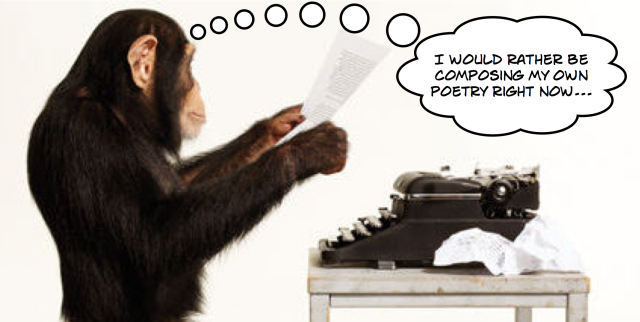
How is this for an absurd waste of time? A foolish man wanted “to feel what it was like to write like F. Scott Fitzgerald.” So, what did he do? Take writing classes? No, he had a better idea. He sat down at the keyboard and proceeded to type out a verbatim copy of The Great Gatsby.
Some of you may have heard this story, from the life of Hunter S. Thompson. He founded the “gonzo journalism” movement which dispenses with the pretense of objectivity. Sarcasm, humor and even profanity abound in this type of writing.
Thompson was apparently well suited to gonzoism, summarizing his life philosophy in this way: “I hate to advocate drugs, alcohol, violence, or insanity to anyone, but they’ve always worked for me.” Which is, presumably, a personal endorsement, rather than advocacy.
Apparently, typing the same words as literary icons also “worked” for Thompson. He also retyped Hemingway’s A Farewell to Arms to learn how to emulate his style.
I wonder what C.S. Lewis and his fellow Inklings would think of this approach to learning how to write. Lewis, of course, treasured good writing and recognized wide reading as a valuable inspiration for successful writing.
Nevertheless, if Lewis and Tolkien heard about Thompson’s exercise, I imagine they would enjoy a good laugh.
Reproducing typed facsimilies cannot be considered writing. Even an utterly illiterate person (or probably even a chimpanzee) could be trained to reproduce an original, key stroke by key stroke. (The monkey would probably benefit from a keyboard tailored to its particularly physiology.)
Emulating is Writing
When a lesser writer seeks to imitate the style of a renowned author, using their own creative skills and not plagiarizing, they are composing something original. There are several considerations to keep in mind.
Copyright restrictions may bar the work from publication. For example, it’s not yet legal for people to publish new Narnia stories.
Trademarks can also limit options for such works. Speaking of which, you don’t need to register a trademark to use TM in the United States, as we at MereInkling(TM) recently learned.
If registered with the USPTO, use the ® symbol after your mark. If not yet registered, you may use TM for goods or SM for services, to indicate that you have adopted this as a “common law” trademark or service mark.
Works written as an homage—without any compensation or profit—is typically allowed. Thus we see innumerable variations on the Screwtape Letters. I have contributed to that mountain myself.
Basing a piece on the themes or voice of a masterpiece is altogether different from plagiarism.
There is one more critical point to make about a legitimate literary “tribute.” It can be based on the most anointed writing of the most impressive author . . . and still not be worth reading at all.
Which returns us to the typescripts reproduced by Thompson. Assuming he reproduced them faithfully, he is immune at least to the charge that the product of his typewriter is inferior to the original text.
That said, I find the two minutes I just invested in writing the following modest haiku more beneficial to my creativity than the hundreds of hours I might have spent literally copying a book I prize.
Retyping fixed words
Rather than shaping one’s own
Is a game for fools.

Ben Franklin taught himself to write by imitating the writing of others! Thanks!
Interesting. I recall reading he only had a couple years of formal schooling. I suppose that’s one way of learning one’s alphabet. I assume though that the author discussed above was beyond that stage of development.
Ha! Gonzo journalism skewered with haiku! Well done …. As for the TM vs. ®, thanks for the handy tip.
Glad you appreciate humor as well.
As for the TM detail, I was surprised by the SM reference. Will need to do some more research on that…
Students used to copy phrases and quotes from famous people each week. (With original author’s name at the end) The concept was to slowly pick up vocabulary and learn sentence structure. And of course it was hand writing practice.
But a whole book or piece? Whew. I’m going with your verse!
I vaguely recall I may have done some sort of copying like that. Good to drill those sorts of healthy life maxims into young brains…
Great thinking, robstroud. i can’t entirely agree with you about the value of copying, though an entire book might be a bit much. Picasso said of art (and writing is art) “You should constantly try to paint like someone else. But the thing is, you can’t! You would like to. You try. But it turns out to be a botch… And it’s at the very moment you make a botch of it that you’re yourself.”
I do believe most of us consciously try to write like authors we respect and enjoy. (After all, that’s why we read their work in the first place.) However, I can’t believe rote copying accomplishes much in developing the skill.
The quote you provide from Picasso is accurate. Even when a “mantle is passed,” the new representative places their own stamp on the work.
Pingback: Add this Book to Your Library « Mere Inkling Press
Pingback: Mickey Mouse Is Now Ours – Mere Inkling Press
Pingback: Meandering Words – Mere Inkling Press